In Trump's New America, Six LGBTQ Kids Speak Out
New laws and executive orders are rolling back the rights of queer kids in the U.S. But how often do we hear them? Uncloseted passed the mic to six out and proud LGBTQ kids.
Editor’s note: This article includes discussions about mental health. If you or a loved one need help, resources are available here.
In the U.S., the rights of LGBTQ youth are under attack. Since President Donald Trump’s inauguration on Jan. 20, he has passed executive orders that effectively erase the concept that—in the eyes of the federal government—people can be transgender or nonbinary.
LGBTQ youth experience mental illness at alarmingly high rates. According to the Centers for Disease Control and Prevention, 41% of LGBTQ kids seriously considered suicide in the last year. And in 2024, the ACLU identified 533 anti-LGBTQ bills, many of which targeted queer kids.
Since LGBTQ kids can’t vote, Uncloseted Media wanted to give them the opportunity to sound off about the current state of affairs for queer youth in the U.S. With parental consent, Luke, Gigi, Liam, Genna, Crow and Diamond agreed to speak with us to tell us about what it’s like to be queer in America in 2025. Moments before we hopped on Zoom, President Trump signed another executive order aimed at curtailing gender-affirming care for transgender people under age 19.
Watch the full interview above or read the transcript here:
Spencer Macaughton, he/him, New York: Hi everyone. I am Spencer Macnaughton, the founder of Uncloseted Media, and I feel so privileged and grateful to be here with an amazing panel of LGBTQ kids from across the United States. We have Gigi, Genna, Diamond, Luke, Lee and Crow with us. And it's going to be a really interesting and fascinating conversation. I think there are so many stories told out there in the media that focus on queer kids but that never include the voices of queer kids. So we're flipping the script and passing the microphone to the kids themselves. So guys, thank you so much for being here and coming on tonight. We appreciate it.
Liam Lee, (he/him), 17, New York: Thanks for having us.
BEING OUT AS A QUEER KID IN AMERICA
Video timecode: 00:42
Spencer: I guess to start, I just want to know a little bit about if you guys have any stories about what it’s like to be an LGBTQ kid in school, in your town, today?
Crow Turner, (they/them),16, Virginia: I personally go to an art school in a very liberal area. So, it's good because I've never really explicitly come out to anybody that I know, but it's just sort of a general acceptance that like, ‘I see you, I get what you are.’ Nobody really says what they are, but girls date girls, boys date boys. Whatever, it's fine. I mean, it isn't easy. It's never easy. But I'm fortunate enough to be in a space like this.
Gigi Rodriguez, (she/they), 13, Illinois: So, when I came out to my dad, I was in fifth grade. Yeah, I told him, and then he was really mad. Like, “You're too young. You should wait until you're an adult.” It was difficult. So I just haven't told him about my sexuality since.
Spencer: You don't bring it up?
Gigi: No, never.
Liam: I have gotten called slurs in school before. Unfortunately, when I came out, which is sort of expected. People just straight up talking about me behind my back. I didn't really care because that's their business. And then my business is mine.
Spencer: Paint a picture of one of those experiences that you had at school when you were called slurs.
Liam: It was during my Agriculture class and I had come out to my whole class because that's like the main group of people I'm going to be with constantly throughout four years of high school. So, I'm not going to go misgendered and dead-named for all four years of high school.
Spencer: Does having those people call you those slurs create a sense of fear when you're at school because you're worried about what could happen next?
Liam: Not exactly, because most of it was talk. It's when they actually start trying to come directly to me and harm me verbally or physically, that's when there's a problem there, if it's constant. Because it does make me feel dysphoric. And I struggle with dysphoria a lot since I don't exactly have the resources to transition. So, that's definitely a struggle when it comes to stuff like that.
Spencer: So, Luke and I met because I was working at “60 Minutes” and flew to Arkansas to do a story on his older brother, who is trans and was suing the state's attorney general because they tried to block access to gender-affirming health care, which I thought was the coolest thing I've ever seen a kid do in my life. Quick update: how is Dylan doing and what's he up to now?
Luke Brandt, (he/him), 16, Greenwood, Arkansas: He's doing good. He has a fiance right now, actually. They moved in together and he is just working. He's taking a break from school and going to go back next year doing something.
LGBTQ KIDS AND MENTAL HEALTH
Video timecode: 03:43
Spencer: I love it. That's awesome. Tell him I say hi. And I want to turn a little bit to LGBTQ mental health, which is a tougher topic. And I want to just read you guys a few statistics on LGBTQ mental health right now, and then have you guys respond. So, in 2022, a Trevor Project poll of 34,000 LGBTQ kids found that 73% reported feeling anxiety, 58% reported depression and 45% said they had seriously considered suicide. And for trans youth, the numbers are even higher than that. 1 in 5 had actually attempted suicide. Those numbers are way higher for LGBTQ people than they are for non-LGBTQ people. As a group of LGBTQ kids, I want to know from you guys, why do you think that is?
Diamond Sherman, (she/he/they), 11, California: In my life I've come across a fair share of homophobia and transphobia, and I do sometimes have anxiety from it. But it's not that big of a deal for me. But I see how it could be overwhelming for other people, because it can be really scary at times. I have had some problems. I have trauma from homophobia. So, I think that's saying something. And I feel like if I was someone else, I would be more susceptible to that kind of stuff. I feel like I would be depressed, or maybe have suicidal thoughts. It could be very dangerous.
Crow: The social stigma is a big factor. But to a certain extent, the political instability surrounding LGBTQ+ rights… like the right to same-sex marriage, is still so recent, and I feel like a lot of people may take for granted the fact that it's a recent thing. And that certain protections are recent and not really super accepted by politicians, for whom it's a new thing. But to us, it's commonplace, you know? And so that sort of dissonance between politicians who feel as though this is a new fangled concept: being queer and being open about that as youth. Whereas, with younger people, it's just a thing that has been around longer to some. At least to me, it's sort of been normalized since I was young, and I've only grown more accepting of it as I got older.
Spencer: Genna, what do you think?
Genna Brown, (he/she), 15, North Carolina: I went to a school that was closer to me, but was more in the country. And the difference between the school I'm actually districted to and that school is like New York and Texas, I swear to God. Just, literally, a lot of ignorance. A lot of rednecks who, some of them, I don't know if they've ever seen or interacted with a queer person in their life based on how they treated me. I was getting called slurs pretty much every day. Nearly got into a few fights because after a while, there's only so much someone can take.
Spencer: Where did this happen and how did they come at you?
Genna: They're pretty much in the hallways, in class changes, in the courtyard. Pretty much everywhere that a teacher wasn't immediately present, or where certain teachers weren't present. Because some teachers truly did not care.
Spencer: But how did that make you feel? Because it is hard to have that, it sounds constant. And in every corner of a school where you're supposed to technically feel safe.
Genna: Throughout the school year, I never really found myself wanting to hide more. But the annoyance did slowly start to turn into anger, which turned into…I don't want to say rage…but somewhere between anger and rage.
Spencer: Diamond, you wanted to say something? I saw your hand up.
Diamond: I used to experience a lot of violence due to me identifying as a boy and wearing dresses and colorful things, and ‘ooh sparkles.’
Spencer: Gosh, I'm sorry. And I want to say, I know we're talking about a lot of tough things here, guys. So if anyone needs to take a break or anything like that, that's okay. Gigi, how are you doing?
Gigi: Being an LGBTQ kid and living in a super suburban area, it's difficult because a lot of the people in my grade and in my school overall are homophobic, like really, really homophobic. I've been called slurs. I'm a lot more closeted now.
THE IMPACT OF AFFIRMING PARENTS
Video timecode: 08:47
Spencer: That's awful. I'm sorry. Gigi. I do want to ask about affirming parents. All your parents gave consent for you to be in this interview and take part in it. What does it mean to you to have parents who accept you?
Liam: It’s definitely a big relief when you know that your parents will support you. Because at least you know that if you have nowhere else to go, then you have a bed to go to. You have food on the table, and they won't push you away. My dad, he's pretty supportive, so I am glad about that.
Genna: My parents were raised Southern Baptist, and it took a while to unlearn all of that. Converting away from Christianity and into Judaism has really helped our family a lot. My dad was always more set in his ways, but I did finally get him to a point of acceptance and tolerance, just not full-hearted support. Until, almost a year ago, he had a massive heart attack and stroke. And that brain damage kind of reversed all the work we had done to get him to that accepting, tolerant, supportive place. So, now I have a mom who loves me unconditionally, and a dad who calls me slurs whenever I mention that I'm gay, because he forgets that I'm gay. And then I tell him that I'm gay. And then he just goes through this whole revelation of, ‘We're Christians. We don't do gay stuff.’ And we even have to remind him that we are not Christians. We have to remind him that he was at the point of being willing to go to a Pride parade just a year ago.
HOW PRESIDENT TRUMP’S LGBTQ ATTACKS MAKE THEM FEEL
Video timecode: 10:27
Spencer: Well, I do want to address the elephant in the room, which is President Trump has been in the office for just over a week now, officially. Trump did spend, with the GOP, upwards of $215 million on anti-transgender attack ads. He said he's going to get rid of so-called “transgender insanity.” And he's already passed many executive orders, some of them removing LGBTQ stuff and HIV stuff from the White House government pages. And obviously, you guys probably know, there were hundreds of anti-LGBTQ bills introduced in the state legislatures last year, many of them targeting queer kids. How does it make you feel when you have a president who is attacking LGBTQ rights in such an aggressive, and I would argue dehumanizing way, especially when you can't vote at your ages?
Crow: For me, it's definitely, very frightening. Especially because right now I'm 16, and so, I'm going to become an adult over the course of his presidency. And quite honestly, I don't know if I'll be able to get the gender-affirming care that I need when I turn 18, as I had planned. And it's really difficult, especially to plan for the future and have that lack of surety that I thought that I would.
Diamond: It just angers me that I feel like I just got some rights as a queer person, and now I'm seeing them being stripped away.
Liam: It also scares me because now, what if they try to take away the safe spaces we have in schools? One of the only places we could actually learn about LGBTQ history, or have a chance to meet other queer kids. And queer kids in schools are already scared enough to even join gay groups. I remember that when I first joined GSA in my freshman year, it was full of people. We were having fun. We did karaoke nights; we were vibing. And comparing it to now, we're lucky if we get at least five people showing up.
Spencer: Why do you think it's become less attended?
Liam: Likely because students are becoming a lot more conservative towards themselves, and keep things to themselves for their own safety. Because I have had friends who have done that. I have friends who are like, “I trust you with this information, but please don't tell anybody else.” And joining a group like GSA, to a lot of people, means coming out in some sort of way. So, definitely that could be a factor.
Genna: In terms of the whole Trump presidency, you asked how we felt. In a word, just powerless. I mean, honestly, I don't know what I can do, especially considering that sometime I’ll be evaporating, because “there are only two sexes,” according to our orange leader. And that is an executive decree. So, as a non-binary person, I no longer legally exist.
Spencer: Well, who in this call, by a show of hands, uses any pronouns other than the ones that match the sex they were assigned at birth?
(Genna, Diamond, Crow, and Liam raise their hands)
So for you guys, how does it make you feel that in the eyes of the federal government now, they don't believe that. They don't think that's real. They don't accept that. Because that is part of the executive order that Genna mentioned that just passed last week.
Crow: I don't know. It's just sort of … it's frustrating. It feels irrational and unwarranted to do that. To remove X gender markings and to legally say that male and female are the only genders, and that it begins at conception, which already is incorrect wording and inaccurate wording. I don't see a reason behind it. And I personally feel like it comes more from a place of hate and a place of appeasement to more extremist views rather than any safeguard against society or any sort of moral values.
Genna: Definitely what you said. There is no point in that decree other than hatred. Alongside the new law that transgender people already are not, or will not, be able to serve in the military. That does not serve this country. If anything, it does the opposite. Why would you actively reduce the number of troops just because you don't like their gender? I mean, that is self-destruction at its finest.
Liam: I also want to add that as LGBTQ kids, you already don't feel heard enough. You don't feel like your parents are supporting you, or like other people don’t support you, teachers, students. Society in general is looking down upon you. You don't feel heard because you can tell people your pronouns, you can tell people your preferred name, and they just completely dismiss that. So you’re already feeling unheard. Now the government is completely just going, “Screw you, you don't exist anymore and you get to have this.” That makes everything a hundred times worse.
TRUMP’S NEW GENDER-AFFIRMING CARE EXECUTIVE ORDER
Video timecode: 16:08
Spencer: So, I don't know if you know this, but just before we got on this call, President Trump signed another executive order aimed at essentially blocking gender-affirming care for transgender people under age 19. Here's the quote from the president in a statement: “It is the policy of the United States that it will not fund, sponsor, promote, assist or support the so-called ‘transition’ of a child from one sex to another. And it will rigorously enforce all laws that prohibit or limit these destructive and life-altering procedures.” And the order says that applies for pre-pubertal blockers, for hormones and for any surgeries. We're in a really unique position to be able to talk to six LGBTQ kids right now—what are your immediate reactions to that?
Liam: That's dangerous. There are young adults who are 18 or even 18 and lower. There are people who are already on hormones and were already going through these changes. Taking that away definitely has health risks to them, because now they have something that their body is used to, and now that is being ripped away from them just because of a law that's coming out of the blue.
Spencer: It could be medically dangerous, is what you're saying.
Liam: Yeah.
Crow: I feel like it really just loops back to what I just said, where it doesn't feel like this is coming from a place of any sort of logical standpoint.
Luke: It's just making me a lot more concerned for other kids out here, because it's not just now kids getting discriminated against and feeling like they don't belong. It's that they actually are getting these things that make them feel like themselves getting stripped away. And I look at my brother and how much these medications and surgeries have helped him and how much he can feel more safe and accepting of himself. If other kids can't get this, then they're not going be able to feel what that’s like — happiness and acceptance of themselves.
Spencer: And what did you learn about being trans and the necessity for gender-affirming healthcare by watching your brother go through that journey himself?
Luke: I just saw more of him. Obviously, I knew him because he came out when he was, I don't know, ten? I mean, 12 or 13. It's just these past seven years, he's just grown up more and more and more and been able to really see what he's like, what he wants to be, being himself and growing into his own skin. He's more himself and I see more of him.
Spencer: And now he's engaged and happy and living his best life, it sounds like.
Luke: Yeah.
Spencer: When people, you know, adults, pooh-pooh the idea of gender-affirming health care for kids, what do you think that's about?
Crow: For a lot of politicians, not liking gender-affirming care comes from a place of disinformation or misinformation. Because a lot of the rhetoric involving gender-affirming care for minors is under the impression that minors are undergoing surgery, or minors are undergoing hormone replacement therapy, when in reality prepubescent children only go on hormone blockers, typically. And pubescent children will typically go on hormone replacement therapy. But no surgeries are really ever performed on minors. And if they are, it's typically older minors in America, like 16, 17. But nobody is doing top surgery or bottom surgery, or any sort of gender-affirming surgeries on ten-year-olds, on children. I understand why people might be scared. But the phrasing of “mutilation” and of “ruining bodies” is rooted in that misinformation. And so I feel like only through informing people on what gender-affirming care is and what it can be is how people will learn to understand that it's essential to people.
Liam: I also feel that dysphoria plays a large part in it. But like Crow said, it's not like they're taking middle schoolers and putting them in the hospital, just like, “Here you go. Here, here's your transition.” That's not how it works. It's an entire process, and not everything is immediate. And there are a lot of trans people and a lot of nonbinary people who don't transition at all. Because, I personally believe, as a transgender person, you can be transgender without getting surgeries.
Genna: It is terrifying that I could be forced to not find something that works for me because Trump thinks that everyone who receives gender-affirming care wants to mutilate their bodies.
WHEN THEY KNEW THEY WERE LGBTQ
Video timecode: 21:02
Spencer: What age did you realize you were LGBTQ? Can you take me back to the first moment? How old were you and what was it that was like, “Oh My Gosh, I think I'm gay,” or “I think I'm trans.”
Luke: It was probably around middle school. It was kind of everyone was waiting for me to realize, my family kind already knew. And they were just waiting for me to realize. And I don’t know if it was a certain thing. We have so much access to information on the Internet and social media. I think it's just seeing more topics and being more open. I just kind of saw it and realized that maybe it just would be more me.
Spencer: Yeah, I think a lot of people are like, “Social contagion through YouTube.” And I completely disagree with that argument. It's so good that folks, especially in rural or more remote places in the United States, have access to more representations. They can see themselves and then they're not closeted until their sixties, you know?
Crow: I expressed myself in a certain way and I presented myself in a certain way, but I didn’t quite understand if my feelings were coming from “Do I just like presenting myself like this, and these are things that made me feel that little bit more confident in my identity?” or “Do I present myself like this because I feel like a different gender?” And then ultimately that led to a lot of self-reflection as how I classify myself and how I saw myself. And I must have been about 11 at that point. I already knew that I was bi, but I think it was 11. I very confidently was like, “I'm not quite in either gender box.”
RAISE YOUR HAND IF…
Video timecode: 22:43
Spencer: Well, look, I want to do a little hand-raise moment, okay? I'm going to read a statement to you guys and raise your hand if it applies to you. So first, none of you are voting age. If you were 18, raise your hand if you would have voted for Donald Trump.
(No hands are raised)
Raise your hand if you would have voted for any candidate other than Donald Trump.
(Everyone raises a hand)
Got it. Raise your hand if the current political climate in the United States has affected your mental health.
(Everyone raises a hand)
Wow. Everyone. Raise your hand if the current political climate in your state has ever forced you and your family to consider leaving your state or even the country.
(Everyone but Crow raises a hand)
Wow. Five of you. That is intense. Raise your hand if you're at the end of the day, happy you're LGBTQ identifying.
(Everyone raises a hand)
Raise your hand if you feel like you have a supportive group of friends and family in your corner.
(Everyone raises a hand)
SAFE SPACES AND WHAT MAKES THEM PROUD
Video timecode: 23:53
Spencer: Love it. I want to shift into a more positive question, and it's going to sound like a cheesy question, but stay with me. So I think we talk a lot in the queer community about, safe spaces, right? And right now in America, schools aren't always safe spaces because there are certain laws and bills being passed. I want to know, as an LGBTQ kid or even just as a human being, what's your safe space?
Diamond: In my room I have a canopy bed with colorful curtains that I just close so that I can just be comfortable with only blankets and cushions. And at my school, one of the teachers made Rainbow Club, which is a gay safe space, like a gay club where you can come to chat with other LGBTQ people and just have fun and connect and share things.
Gigi: The high school I'm going to, I just went to go take a tour of it last Thursday. Basically, they have a GSA like the Gay Alliance, and there are two LGBTQ teachers in my high school that I'm going to, which are the choir teacher and the band teacher. They're married. So I feel like I can talk to them.
Genna: Why I'm proud to be queer? We make incredible music, dude. I mean, have you ever Chappell Roan?
Gigi: I was just about to mention that!
Genna: OK, yes. Literally!
Crow: For me, something I love about being in the LGBTQ community is just knowing myself and knowing who I am and being confident in that, and receiving love and support from other people who also see that in me, knowing myself for who I am. And only through being in the queer community did I truly experience that.
Luke: One of my favorite things would probably be just the immediate family and community that you have and just being able to be yourself without having any judgment from anybody. They're not going to judge you for who you are.
Spencer: I totally agree with that. There's a solidarity among queer people, I think, at its best. Last but not least, Ms. Gigi.
Gigi: So being on here it meant a lot because I get to meet people who have similar experiences, are also queer and are super cool overall.
Spencer: Well, as I said before, thank you all so much for coming on. Especially as LGBTQ rights are in pretty major turmoil in the United States. I think it is an extremely brave and courageous thing for you guys to do as openly LGBTQ kids coming on to talk to a national news publication. So kudos, hat tip to all of you. You should be super proud of yourselves. And thank you all for being here tonight.
Kids: Thank you!
If objective, nonpartisan, rigorous, LGBTQ-focused journalism is important to you, please consider making a tax-deductible donation through our fiscal sponsor, Resource Impact, by clicking this button:


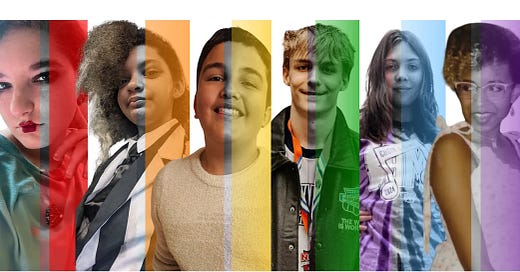




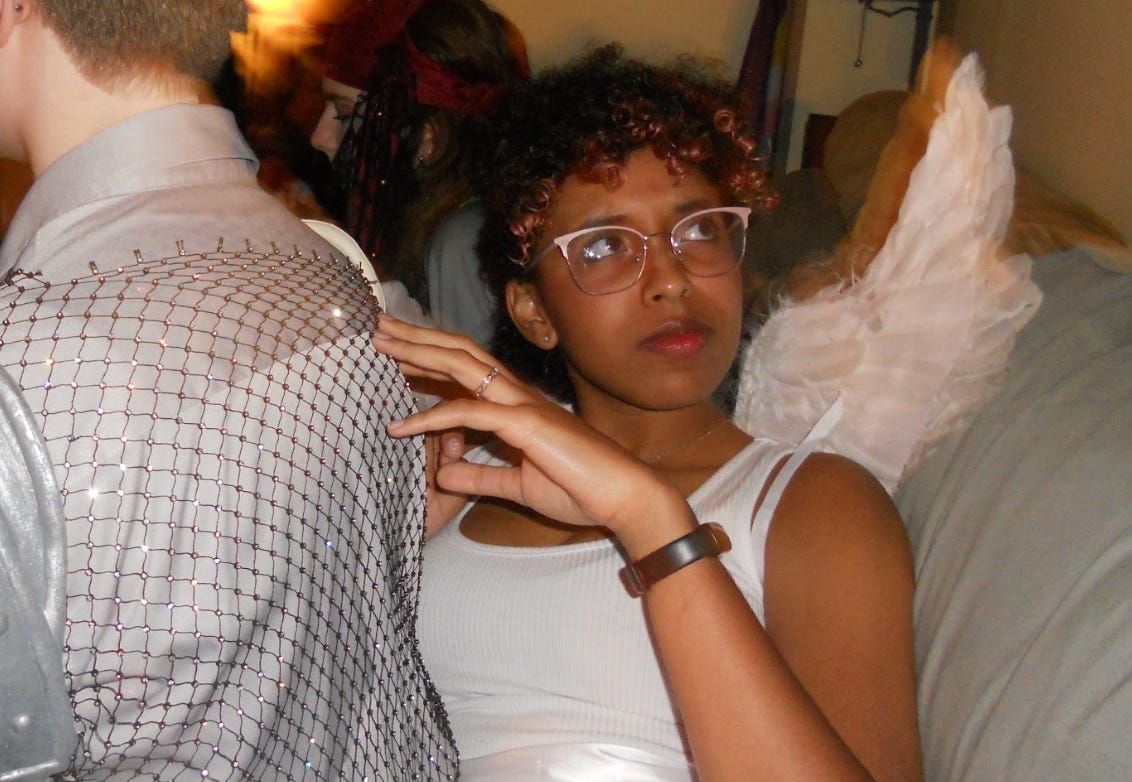
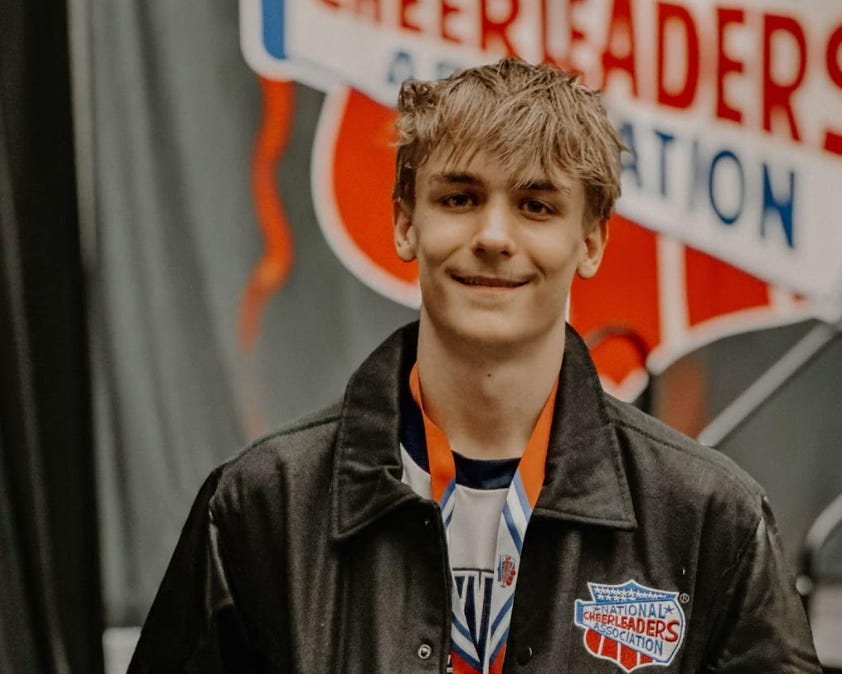
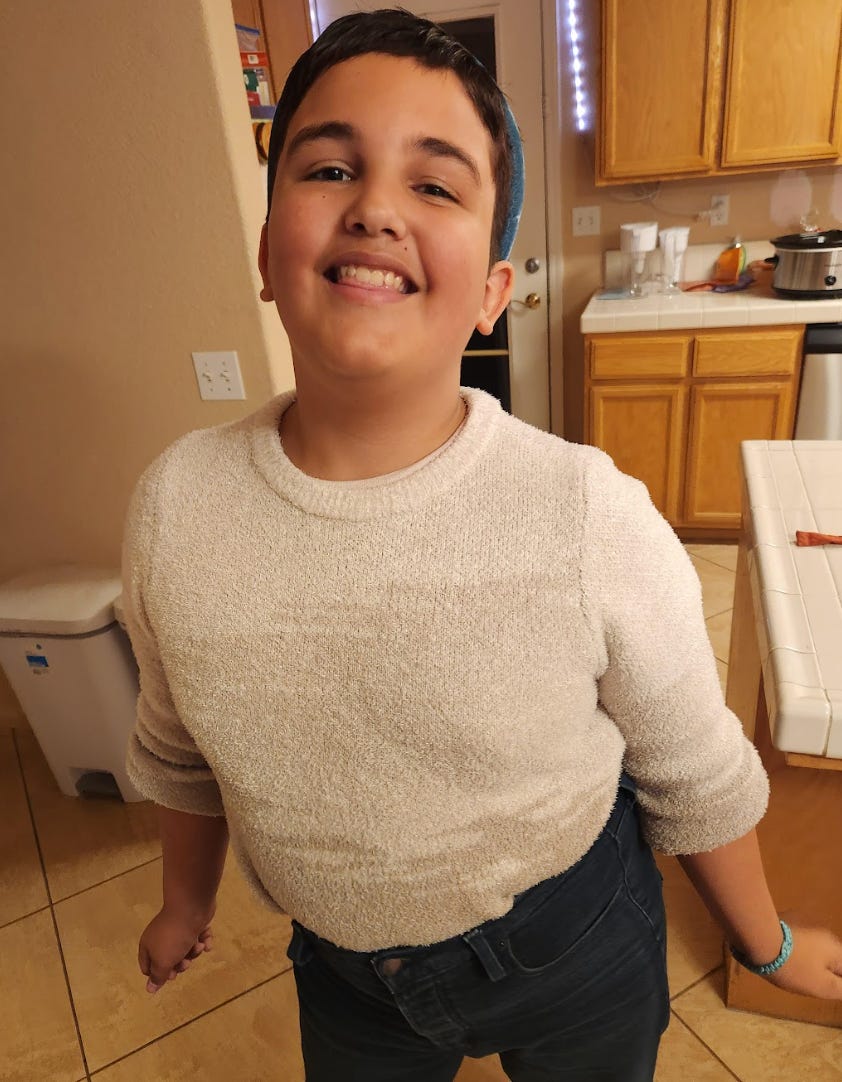
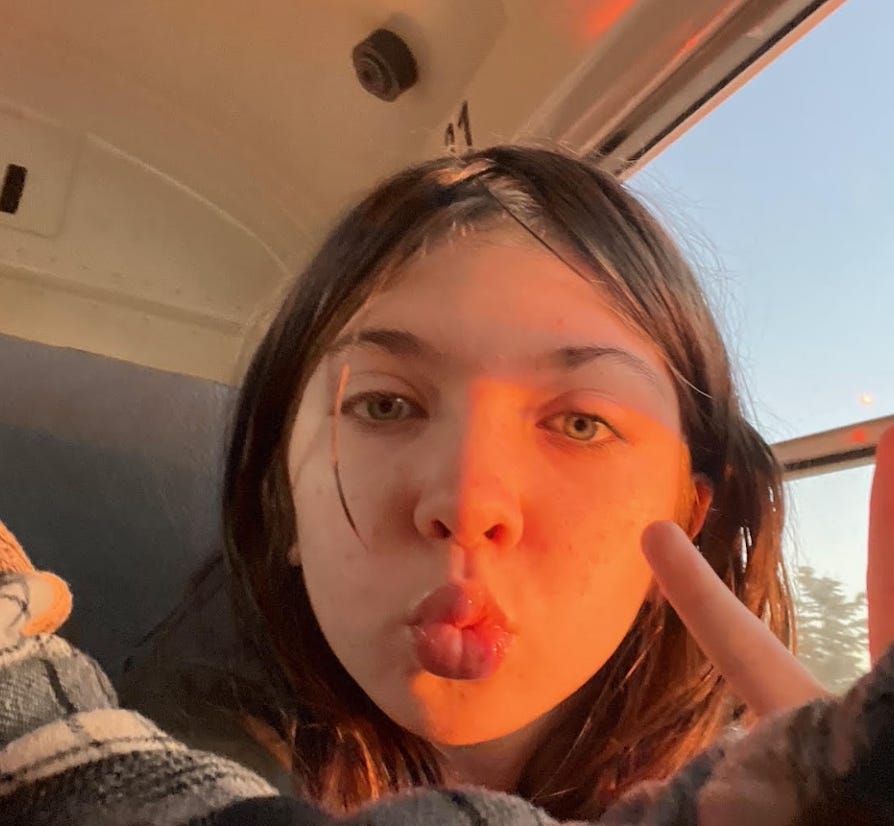
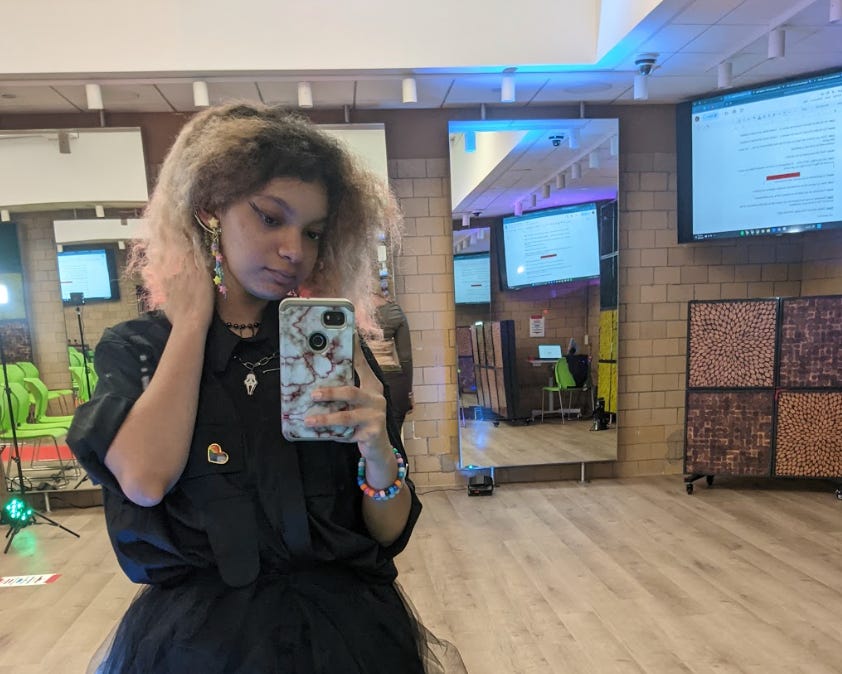
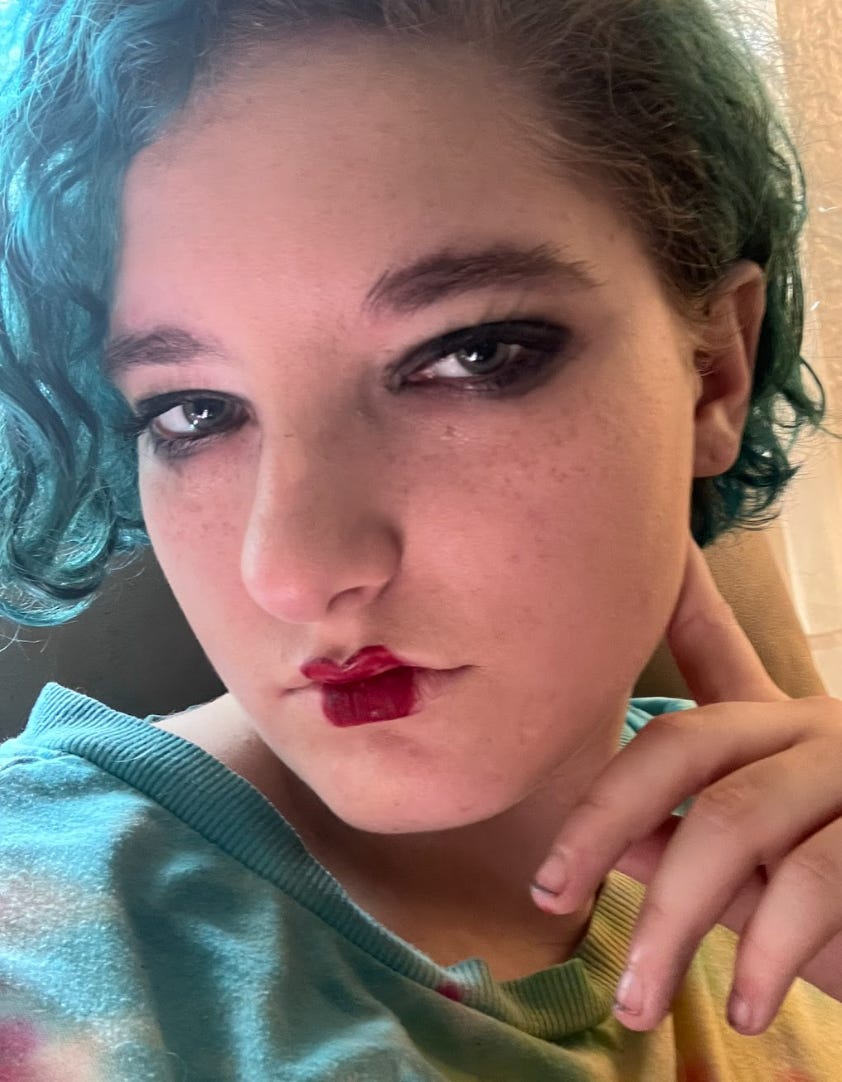
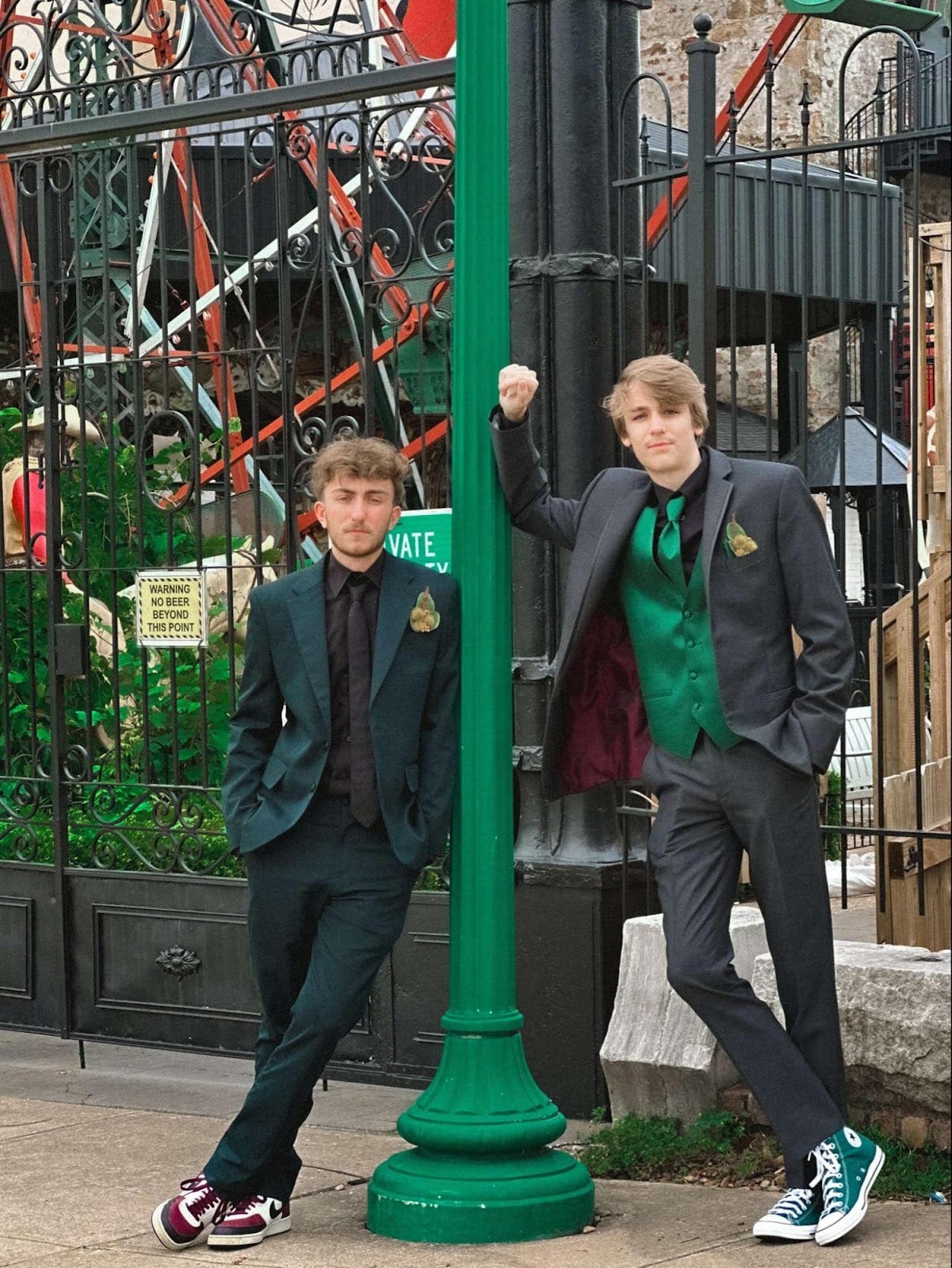
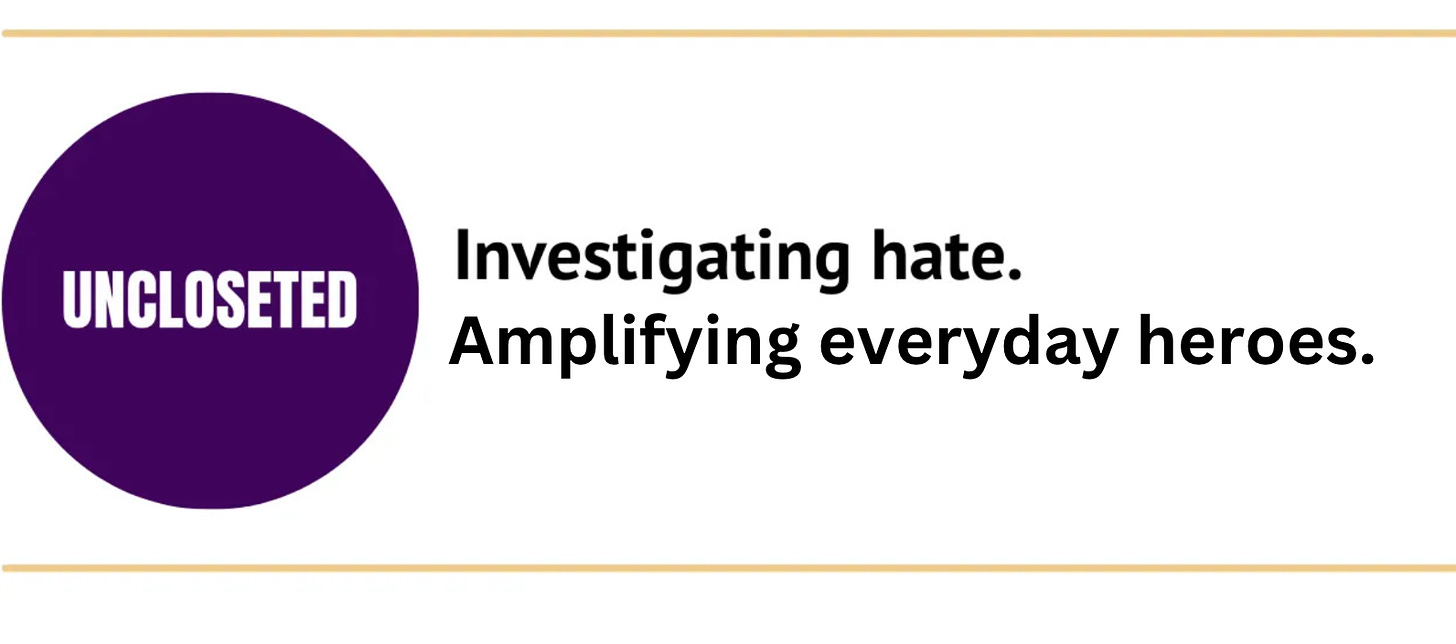

Excellent interview with such brave kids. We need more voices like theirs sharing similar stories, opinions, and messages.
Praise the Lord. This is why I voted for Trump. Yeehaa!